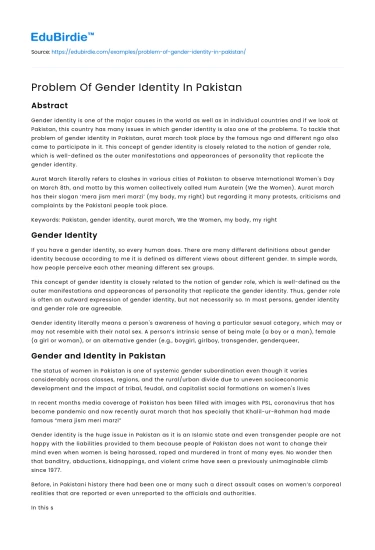Introduction
Gender identity issues in Pakistan represent a complex interplay of cultural, religious, and socio-political factors. While the country has made some strides in acknowledging and addressing the rights of transgender individuals, traditional gender roles and societal norms continue to pose significant challenges. The problem of gender identity is multifaceted, involving not only legal recognition but also social acceptance and integration. This essay explores the nuances of gender identity in Pakistan, examining the legal framework, societal attitudes, and the lived experiences of transgender individuals. By investigating these areas, the essay aims to provide a comprehensive understanding of the obstacles faced and the progress achieved in this domain. Through an analysis of these dimensions, the essay will highlight the necessity of a more inclusive approach to gender identity in Pakistan.
Legal Framework and Gender Identity
In recent years, Pakistan has taken notable steps towards legal recognition of transgender individuals. The Transgender Persons (Protection of Rights) Act of 2018 marked a significant legislative milestone, granting transgender individuals the right to self-identify their gender on official documents. This law also provides for equal employment opportunities and safeguards against discrimination. However, the implementation of these legal provisions remains inconsistent. According to a report by Human Rights Watch, while the law is progressive on paper, the lack of awareness and enforcement mechanisms results in continued marginalization of transgender individuals. For instance, many governmental institutions still lack the infrastructure or the willingness to accommodate gender-diverse individuals, often leading to bureaucratic hurdles and exclusion from essential services.
Save your time!
We can take care of your essay
- Proper editing and formatting
- Free revision, title page, and bibliography
- Flexible prices and money-back guarantee
Despite these legal advancements, societal attitudes towards gender identity remain largely conservative. In a country where traditional gender roles are deeply entrenched, transgender individuals often face ostracization from their families and communities. This societal resistance undermines the effectiveness of legal protections, as laws alone cannot alter deep-seated cultural norms. To address this issue, there is a pressing need for awareness campaigns and educational programs that challenge stereotypes and promote inclusivity. As noted by Dr. Qasim Iqbal, a prominent activist, "Legal recognition is just the first step; societal acceptance is where the real battle lies."
Societal Attitudes and Challenges
The societal perception of gender identity in Pakistan is heavily influenced by cultural and religious narratives. Traditional interpretations of gender roles often leave little room for deviation, with any divergence viewed as a threat to social order. This results in transgender individuals facing widespread discrimination, violence, and exclusion. A Human Rights Commission of Pakistan report highlights that transgender persons are frequently subjected to harassment and physical assault, with limited recourse to justice due to societal stigmatization and police apathy.
Moreover, the media portrayal of transgender individuals often perpetuates stereotypes, portraying them as objects of ridicule or pity rather than as equal members of society. This negative representation exacerbates their marginalization and hinders efforts towards social integration. Countering these stereotypes requires a concerted effort from both governmental and non-governmental organizations to promote positive narratives and role models. Engaging religious leaders in dialogue is also crucial, as they hold significant influence over public opinion. By fostering a more inclusive discourse, society can begin to dismantle the prejudices that hinder gender equality.
Economic and Social Integration
Economic marginalization is a critical aspect of the gender identity problem in Pakistan. Transgender individuals often find themselves excluded from formal employment opportunities, forcing many into informal sectors with little to no job security. A study by the International Labour Organization found that discrimination in hiring practices is rampant, with many employers unwilling to hire transgender employees due to societal biases or fear of backlash. This economic exclusion not only perpetuates poverty but also limits access to healthcare, education, and other essential services.
Efforts to improve the economic standing of transgender individuals must address these systemic barriers. Initiatives such as vocational training and microfinance programs can empower transgender persons by providing them with the skills and resources needed to achieve financial independence. Furthermore, inclusive workplace policies and diversity training for employers can help create a more welcoming environment for gender-diverse individuals. By fostering economic empowerment, society can take significant strides towards the social integration of transgender persons, allowing them to contribute meaningfully to the community.
Conclusion
The problem of gender identity in Pakistan is a complex issue that requires a multifaceted approach. While legal advancements have laid the groundwork for recognizing and protecting the rights of transgender individuals, societal attitudes and economic barriers continue to pose significant challenges. Addressing these issues necessitates a comprehensive strategy that includes legal reform, societal change, and economic empowerment. By promoting awareness, challenging stereotypes, and fostering inclusivity, Pakistan can move towards a more equitable society where all individuals, regardless of gender identity, are afforded dignity and respect. As the country continues to grapple with these challenges, it must remain committed to creating a future where diversity is celebrated and all citizens enjoy equal rights and opportunities.






 Stuck on your essay?
Stuck on your essay?

